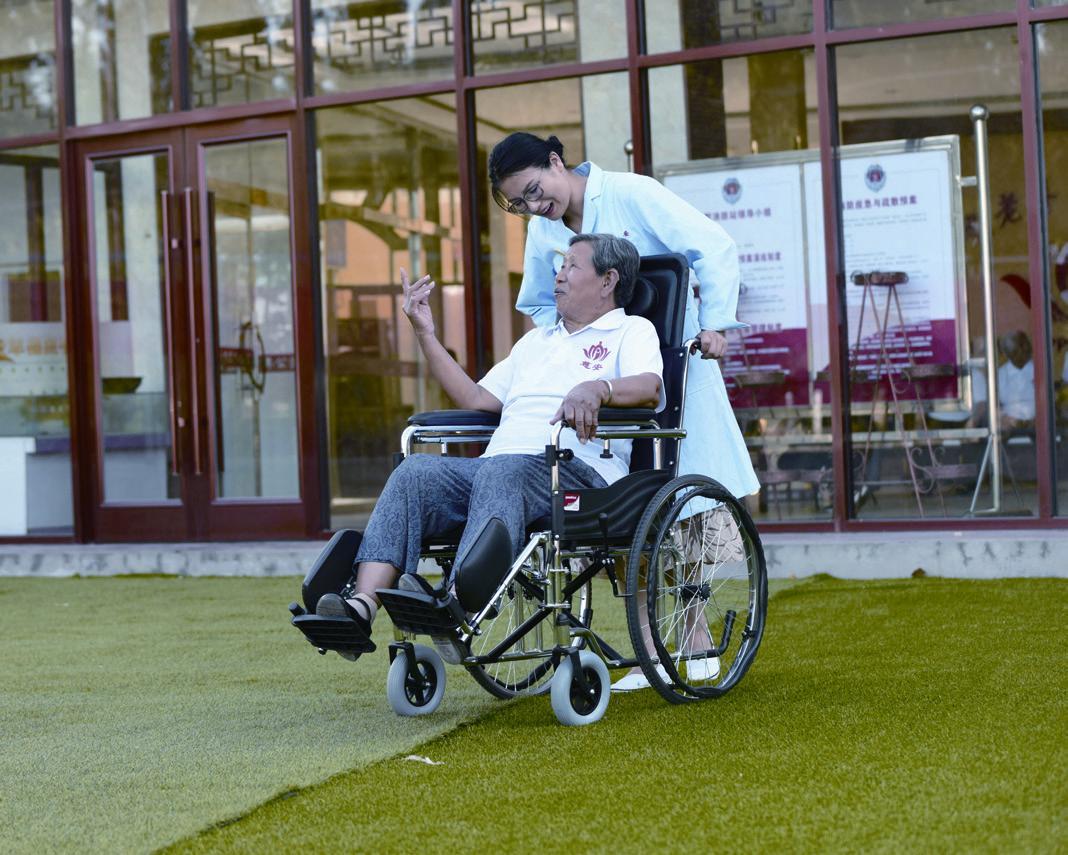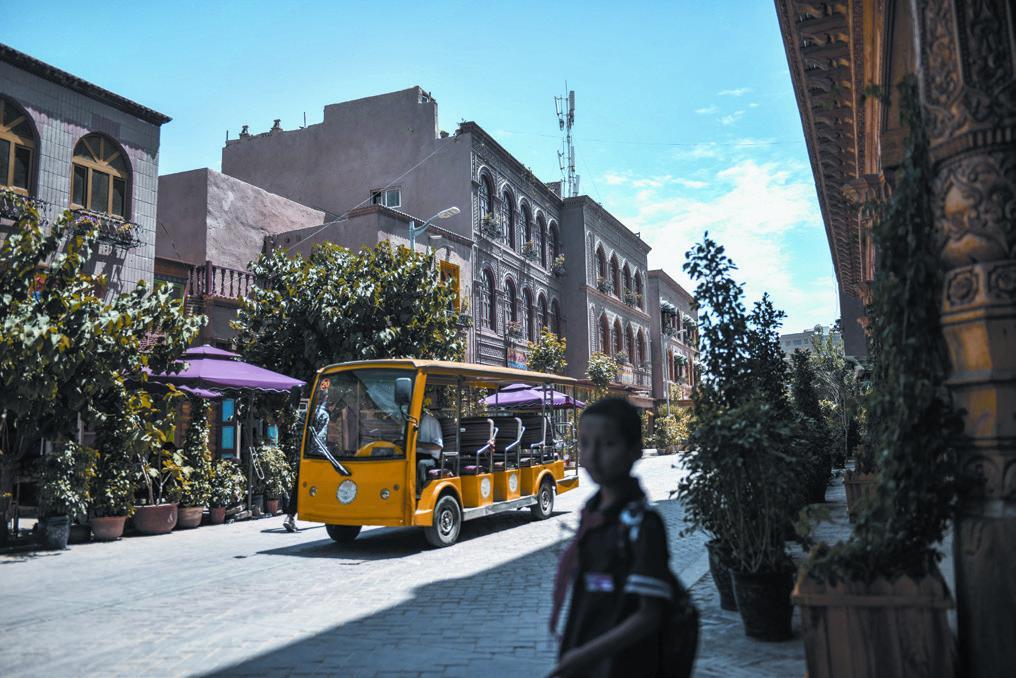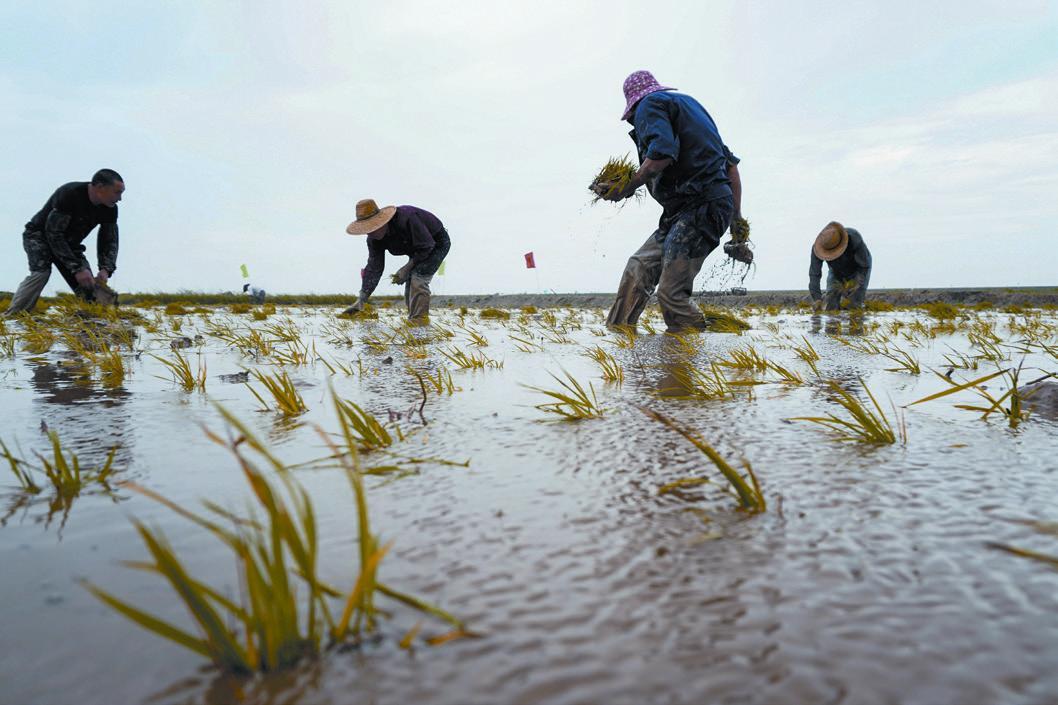Young and Promising

Students play at a primary school in Jinuoshan Jino Township in Xishuangbanna Dai Autonomous Prefecture, southwest Chinas Yunnan Province, on June 11. The township is a major residential area of the Jino ethnic group with a population of more than 20,000.
Genetic Resources
The State Council, Chinas cabinet, has published a regulation on the management of human genetic resources that will take effect on July 1.
The regulation aims to enhance protection of human genetic resources, promote their proper use and tighten regulation and supervision, said a State Council statement on June 10.
The government will conduct surveys on human genetic resources and introduce a system to record and register major pedigrees in human genetics and those in specifi c regions, according to the regulation.
Foreign organizations and domestic institutions founded or controlled by foreign entities will have to work with Chinese partners if they need human genetic resources in China for scientifi c research, the document said.
Any act to make human genetic resources information open to the public or to provide such information to foreign countries should be recorded. Such an act must be subject to a security review since it might affect public health, national security or public interest.
Private Hospitals
The government will ramp up support for private medical and health institutions, and push forward efforts to upgrade services and simplify government approvals, according to a new directive jointly released by 10 central government agencies.
The number of private medical and health institutions reached 459,000, accounting for about 46 percent of the countrys total, as of the end of 2018, according to Wang Hesheng, Vice Minister of the National Health Commission, on June 12.
In the same time frame, China had 21,000 private hospitals or 63.5 percent of all hospitals, Wang added.
The number and scale of public hospitals should be strictly controlled in accordance with requirements of the 13th Five-Year Plan(2016-20) to leave suffi cient room for the development of private medical institutions, according to the directive.
When increasing or adjusting medical and health resources, local authorities should fi rst consider medical and health institutions run with funding from non-government sources, said the document.
Government purchases of services from private medical and health institutions should be supported, in accordance with the principle of fair competition and merit-based selection.
Credit System
China will establish, in accordance with the law, authoritative, unifi ed and accessible credit records of all market players based on their unifi ed social credit codes, according to a State Council executive meeting on June 12.
The mechanism of credit pledge by market players should be promoted, where applications under certain government review items will be processed right away when applicants pledge that they meet eligibility requirements and submit needed documentation.
A credit blacklist system will be further developed together with norms to go by in determining entities to be put on the list, to enhance inter-agency punishment for acts of bad faith. Strict penalties, including denying market access, will be meted out to those who act in bad faith in accordance with laws and regulations.
Tiered credit-based regulation will be promoted through inspections by randomly selected inspectors of randomly selected market players and prompt release of inspection results. The ratio of inspection targets and frequency of inspection shall be decided in light of the credit records of market players.
Blood Donation
China has witnessed more than 20 years of consecutive growth in the number of voluntary blood donations, from around 300,000 in 1998 to nearly 15 million in 2018, an offi cial with the National Health Commission (NHC) announced on June 10.
The volume of blood collected has also seen a marked increase of more than four times the amount since the Blood Donation Law took effect in 1998, said Zhou Changqiang, Deputy Director of NHCs Medical Administration Bureau, at a press conference.
Amid efforts to improve clinical blood security in medical institutions at and below the county level, half of the countrys blood supply had been allocated to these institutions for three consecutive years since 2016, NHC data showed.
In addition, a multi-level blood early warning and distribution mechanism has been established to ensure emergency blood supply, Zhou noted.
In 2018, around 1.84 million units of blood were allocated among regions across China, of which 1.59 million units were transferred within provincial regions and 255,000 units among them.
Caring for the Elderly

Yang Ruimei talks with a resident in her nursing home in Zhangtai Township in Xingtai City, north Chinas Hebei Province, on June 12. Yangs facility has provided daily care for more than 150 seniors in Zhangtai since 2014.
Call for Peace in HK
Carrie Lam Cheng Yuet-ngor, Chief Executive of Hong Kong Special Administrative Region (HKSAR), condemned the violence and called for peaceful expression of different views, after the HKSAR Legislative Council (LegCo) postponed a meeting to discuss the amendments to two ordinances due to a riot on June 12.
The meeting, originally scheduled at 11:00 a.m. local time, planned to discuss amendments to the Fugitive Offenders Ordinance and the Mutual Legal Assistance in Criminal Matters Legislation Ordinance. Tabled by the HKSAR Government at the LegCo in April, they aim to fi ll loopholes in HKSARs existing legal framework concerning mutual legal assistance in criminal matters.
At about 8:00 a.m. local time, protesters gathering around the LegCo Complex dashed to nearby roads and obstructed traffi c. They lifted up bricks from the pavement and demolished railings to create roadblocks, causing severe traffi c congestion.
The protesters also used violent acts to storm the LegCo Complex in the afternoon.
“Hong Kong is a free, open and diverse society where people have different views on anything. But there is a bottom line for expressing opinions. If radical and violent means can be used to achieve the goal, these scenes will only become more and more fi erce and will certainly bring harm to Hong Kong,” Lam said in a videotaped speech.
Various groups in the HKSAR have voiced support for the amendments. In an online petition initiated in April by a group of people from all walks of life in Hong Kong, over 900,000 people have signed their names in support of the amendments as of June 12.
Some organizations in the HKSAR also launched protests against intervention by foreign countries and external parties in the issue.
New Look
An electric-powered vehicle for transporting tourists makes its way in the ancient city of Kashgar, northwest Chinas Xinjiang Uygur Autonomous Region, on June 12.
Before the peak summer tourism season, the area has improved infrastructure and services to help tourists better experience its time-honored folk culture.

Rural Tourism
China is looking to list a number of key villages for promoting rural tourism, according to a circular released by the Ministry of Culture and Tourism and the National Development and Reform Commission.
To be listed, a village should have rich culture and tourism resources, boast sound protection of nature, traditional culture and other resources, and have accommodations that can meet tourists various needs, the circular said.
It is also required to have a mature and high-quality system of tourism products, complete infrastructure and public services, and the capacity to help with the employment of locals in the tourism sector.
Those that make the list will have precedence in enjoying supportive policies on rural tourism from the country, the circular said.
Unreliable Entities List
The Ministry of Commerce(MOFCOM) said on June 6 that the procedure for creating a list of unreliable entities was being formulated and the details would be released in the near future.
Without giving a specifi c date, MOFCOM spokesperson Gao Feng said the list would set a general standard, with no particular sector, enterprise, organization or individual being targeted.
In establishing the unreliable entities list, China has used international common practices as reference, aiming to maintain market order for fair competition, Gao said at a weekly press briefi ng.
“This is a normative system tar- geting those that disrupt the market for non-commercial purposes,” Gao said, adding that those who abide by Chinas laws and regulations, market rules and contracts dont need to worry.
“While implementing the unreliable entities list, we will protect enterprises legitimate rights and interests in accordance with the law,”he said.
Railway to Tibet
Builders lay tracks at a site in Ngagzha County, southwest Chinas Tibet Autonomous Region, on June 6. Ngagzha is the second station on the Nyingchi-Lhasa section of the Sichuan-Tibet Railway. The station marks the completion of 50 km of track of the 435-km Nyingchi-Lhasa section.

Opening-Up Plan
Chinas top securities regulator announced on June 13 that the country will soon unveil a series of measures to further open up its capital markets.
These will include amendments to the Qualifi ed Foreign Institutional Investor and RMB Qualifi ed Foreign Institutional Investor schemes to facilitate more overseas participation in the capital markets, Yi Huiman, Chairman of the China Securities Regulatory Commission, said at the Lujiazui Forum in Shanghai.
China will also ease restrictions on overseas banks access to the securities investment fund custodian business and to further open up the futures market.
The country will allow private equities by overseas fund managers to trade Hong Kong-listed stocks via the stock connect program and facilitate the issuance of yuandenominated Panda bonds by overseas institutions, Yi said.
China also plans to expand overseas institutional investors access to the exchange bond market, according to Yi.
While further opening up the capital markets, China will continuously improve its risk monitoring and warning mechanisms to prevent imported risks, maintain the order of cross-border investment activities and hold to the bottom line that no systemic fi nancial risks would occur, Yi said.
Shaking off Poverty
Governments at all levels have been asked to give priority to impoverished counties while purchasing farm produce to help them get rid of poverty, according to a statement by the Ministry of Finance.
“This move will help enhance poor peoples motivation to shake off poverty on their own,” the statement said.
Local authorities should favor agricultural products from 832 poor counties in their procurement.
Governments should make sure that their canteens purchase a certain proportion of agricultural products from these poor counties.
China is aiming to eradicate poverty and build a moderately prosperous society in all respects by 2020.
After lifting 13.86 million people from poverty last year, the number of impoverished rural residents declined to 16.6 million by the end of the year.
Super-Rich Group
Chinas super-rich group is growing steadily and is upbeat about the domestic opportunities while allocating their assets, a report showed.
The number of Chinas high net worth individuals (HNWIs) with investable assets topping 10 million yuan ($1.45 million) reached 1.97 million by the end of 2018, according to the 2019 China Private Wealth Report released by global consultancy Bain& Company and China Merchants Bank.
They held total investable assets worth 61 trillion yuan ($8.82 trillion), registering a compound annual growth of 12 percent.
A total of 23 provincial regions had over 20,000 local HNWIs by the end of 2018, while Guangdong, Shanghai, Beijing, Jiangsu, Zhejiang and Shandong each had over 100,000 HNWIs.
The Chinese super-rich are shifting their investment focus to the domestic market as the opening up of the capital market and other factors create fresh opportunities, the report said.
Private banking clients are making more balanced asset allocation and showing strong intention to seek professional asset management services, according to Jennifer Zeng, a partner at Bain & Companys Hong Kong offi ce who leads Bains Greater China Financial Services practice.
The report predicted that Chinas private wealth market would maintain steady growth in 2019, with total HNWIs reaching about 2.2 million and their wealth totaling 68 trillion yuan ($9.83 trillion), both up 11 percent from 2018.
Camel Business
A herdsman in a county of Altay Prefecture, northwest Chinas Xinjiang Uygur Autonomous Region, carries fresh camel milk on June 11. With an upgraded method in the camel dairy industry featuring cooperation among companies, cooperatives, breeding bases and farmers, the annual per-capita income of farmers has reached 30,000 yuan ($4,338).

Boosting NEV Use
The use of new-energy vehicles(NEVs) will be encouraged to promote high-quality development of the sector and create a strong domestic market, according to a guideline jointly released by the National Development and Reform Commission (NDRC) and two other central departments on upgrading the countrys consumption in 2019-20.
In addition, the cost of NEV production will be substantially lowered and the research and industrialization of the new generation of NEV batteries accelerated.
Local governments are strictly prohibited from imposing any limit on the use of NEVs, and the places where the limits exist should abolish them, said the guideline.
It also encouraged local governments to give support for the purchase of fi rst NEVs by families which dont have a car and reduce parking fees.
Chinas auto industry aims to popularize automatic, smart and green cars in the future, according to the guideline.
China saw robust sales growth of NEVs in the fi rst four months of this year with the sales volume of 360,000 NEVs, a surge of 59.8 percent over the same period a year earlier.
Sea Rice Planting
Farmers plant “sea rice” in a reclaimed area of tidal fl ats in Ruian, east Chinas Zhejiang Province, on June 6. The inauguration ceremony of a saline-alkali land improvement and sea rice smart agriculture demonstration base was held the same day.

Bond Market Boom
Chinas Bond Connect program saw more overseas investors and capital fl owing into the Chinese mainlands interbank bond market in May, according to the China Foreign Exchange Trade System(CFETS).
The trading volume of the program reached 158.6 billion yuan ($23 billion) with an average daily turnover approaching 7.6 billion yuan ($1.1 billion) last month.
Policy bank bonds accounted for 48 percent of the total trading volume in May, totaling 75.6 billion yuan ($10.9 billion), while the Negotiable Certifi cates of Deposits contributed 47.7 billion yuan($6.9 billion), or 30 percent of the total monthly trading volume, the CFETS said.
In May, the program attracted 108 new investors from around the world and saw the debut of investors from Thailand, expanding its coverage to 28 countries and regions.
By the end of May, a total of 947 overseas institutional investors got into the China Interbank Bond Market, according to the CFETS.
The Bond Connect program was launched in 2017, enabling overseas investors to invest in the Chinese mainlands interbank bond market using f niancial institutions of the mainland and Hong Kong.

